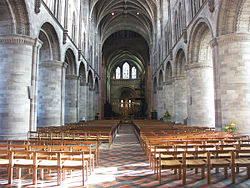Gilbert Foliot
| Gilbert Foliot | |
|---|---|
| Bishop of London | |

Interior view of Hereford Cathedral, the lower sections predate Foliot's time as bishop.
|
|
| Appointed | 6 March 1163 |
| Term ended | 18 February 1187 |
| Predecessor | Richard de Beaumis |
| Successor | Richard FitzNeal |
| Other posts |
Bishop of Hereford Abbot of Gloucester |
| Orders | |
| Consecration | by Theobald of Bec, Archbishop of Canterbury |
| Personal details | |
| Born | c. 1110 |
| Died | 18 February 1187 |
Gilbert Foliot (c. 1110 – 18 February 1187) was a medieval English monk and prelate, successively Abbot of Gloucester, Bishop of Hereford and Bishop of London. Born to an ecclesiastical family, he became a monk at Cluny Abbey in France at about the age of twenty. After holding two posts as prior in the Cluniac order he was appointed Abbot of Gloucester Abbey in 1139, a promotion influenced by his kinsman Miles of Gloucester. During his tenure as abbot he acquired additional land for the abbey, and may have helped to fabricate some charters—legal deeds attesting property ownership—to gain advantage in a dispute with the Archbishops of York. Although Foliot recognised Stephen as the King of England, he may have also sympathised with the Empress Matilda's claim to the throne. He joined Matilda's supporters after her forces captured Stephen, and continued to write letters in support of Matilda even after Stephen's release.
Foliot accompanied Theobald of Bec, the Archbishop of Canterbury, to a papal council at Reims in 1148. During his time there he was appointed to the Diocese of Hereford by Pope Eugene III. Despite a promise made in Reims not to recognise Stephen, Foliot on his return to England nevertheless swore fealty to the king, causing a temporary rift in his relationship with Henry of Anjou, Matilda's son, who eventually became King Henry II of England in 1154. When Theobald died in 1160, it was widely assumed that he would be replaced by Foliot, but King Henry nominated his Chancellor, Thomas Becket, instead. Foliot later claimed to have opposed this appointment, and supported Henry during the king's dispute with the new archbishop. Foliot was translated, or moved, to the Diocese of London in 1163, perhaps as consolation for not receiving Canterbury.
...
Wikipedia
